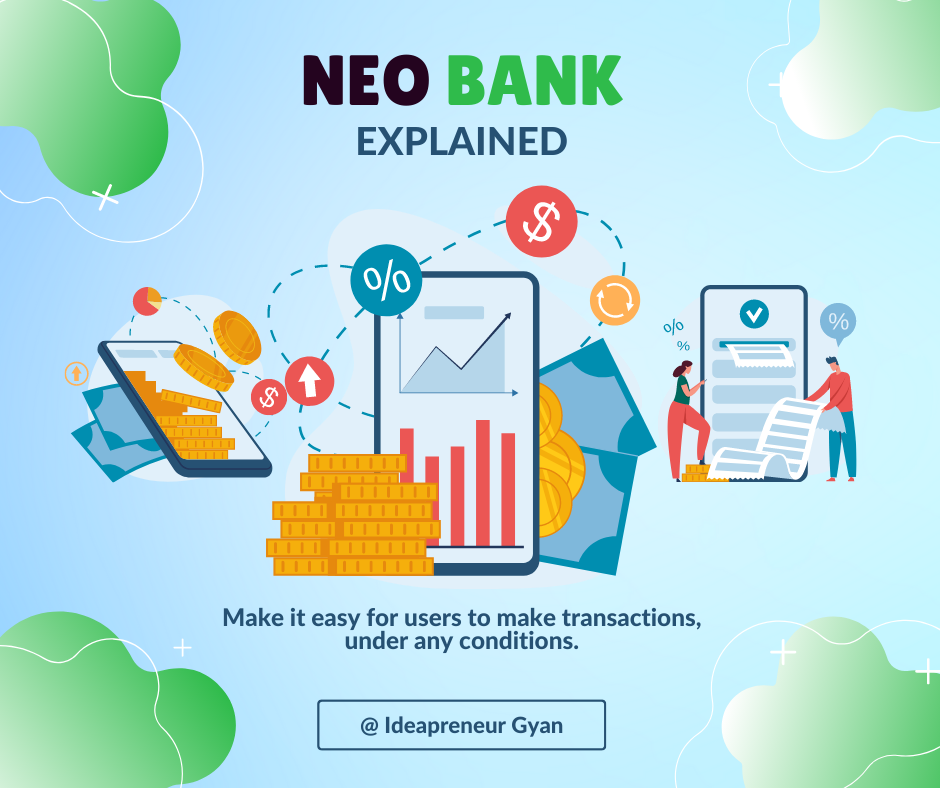NEO BANK CONCEPT

NEO bank
Do you know what a bank is? A bank is a place where you can keep your money and use it to pay for things. But, a neo bank is a little bit different.
A neo bank is a type of bank that operates completely online, which means you don't have to go to a physical building to use it. You can access your account and manage your money using just your phone or computer.
Neo banks also offer many different services, such as allowing you to set up a savings account, make payments, and even get a debit card. And, because they're online, they can be more convenient and accessible for everyone.
So, a neo bank is just like a regular bank, but it operates entirely on the internet, making it easier for you to manage your money from anywhere, at any time!
Neo Bank's feature include.
- No physical branches: Unlike traditional banks, neo banks don't have physical branches. This means you can access your account and manage your finances from anywhere, as long as you have an internet connection.
- Technology-driven: Neo banks are heavily reliant on technology to offer their services. They use the latest in mobile and online banking technologies to make banking easier and more convenient for their customers.
- Low or no fees: One of the benefits of using a neo bank is that they often have lower fees or no fees at all compared to traditional banks. For example, they may not charge you for overdrafts or foreign transactions.
- Customer-focused: Neo banks focus on providing a customer-centric experience. They are designed to make banking simple and easy for everyone, regardless of their financial background or knowledge.
- Innovative services: Neo banks are often at the forefront of innovative financial services. They may offer services like budgeting tools, savings goals, and investment options.
So, in short, a neo bank is a new type of bank that operates online, offers low or no fees, is technology-driven, customer-focused, and provides innovative services.
The concept of neo banks, also known as digital or challenger banks, originated in Europe and the first neo bank was probably Fidor Bank, which was founded in Germany in 2009. Fidor Bank was one of the first banks to offer its services entirely through digital channels and to focus on delivering a customer-centric experience.
Since then, the concept of neo banks has spread globally, with many startups and established financial institutions launching their own digital banks to meet the growing demand for convenient, technology-driven banking services. Today, neo banks are operating in many countries around the world, including the United States, the United Kingdom, Australia, and many more.
In the UK, the rise of neo banks has been driven by a combination of factors, including favorable regulatory policies, a large and technologically-savvy consumer market, and a competitive banking sector. As a result, the UK has seen the emergence of several successful neo banks, such as Monzo, Starling Bank, and Revolut.
In Europe, the neo bank trend has also been driven by favorable regulation and a growing demand for digital banking services. Countries like Germany, France, and Spain have all seen the emergence of neo banks that are competing with traditional banks to offer more convenient, accessible, and innovative financial services.
In South Asia, the neo bank trend is still in its early stages, but there are a few notable players in the market. Some of the leading neo banks in the region include:
- Paytm Bank - Based in India, Paytm Bank is a fully-licensed neo bank that offers a range of digital financial services, including mobile banking, bill payments, and more.
- Grab Financial - Grab Financial is a subsidiary of the Southeast Asian ride-hailing company, Grab. Based in Singapore, Grab Financial offers a range of neo banking services, including mobile payments, lending, and insurance.
- Jirnexu - Jirnexu is a fintech company based in Malaysia that provides a range of financial services, including digital banking, insurance, and lending.
- CIMB EVA - CIMB EVA is a digital-only bank in Malaysia that offers a range of banking services, including savings accounts, loans, and investment products.
These are just a few examples of neo banks operating in South Asia, and as the region continues to grow and adopt digital technology, it is likely that we will see more neo banks emerge in the coming years.
